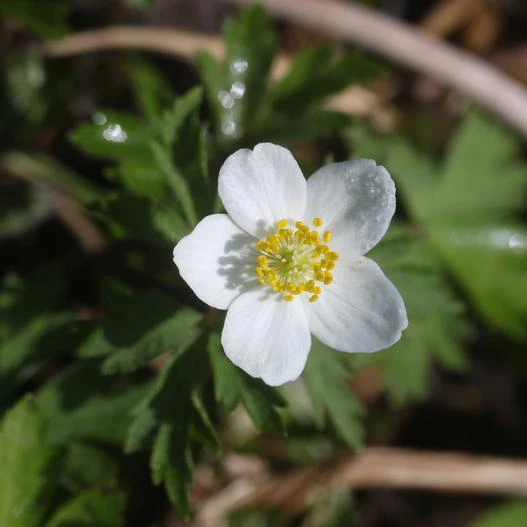Woodland Anemone
(Anemone stolonifera)
Woodland Anemone (Anemone stolonifera)
/
/

Alpsdake
CC BY-SA 4.0
Image By:
Alpsdake
Recorded By:
Copyright:
CC BY-SA 4.0
Copyright Notice:
Photo by: Alpsdake | License Type: CC BY-SA 4.0 | License URL: https://creativecommons.org/licenses/by-sa/4.0 | Uploader: Alpsdake | Publisher: Wikipedia Commons

























Estimated Native Range
Climate Requirements
| • Precipitation | 74" - 103" |
| • High Temp. | 63°F - 80°F |
| • Low Temp. | 7°F - 28°F |
Summary
Anemone stolonifera, commonly known as Woodland Anemone, is an evergreen perennial herb native to forest floors and shaded stream banks in East Asia, particularly in Japan, Korea, and China. It typically grows to a height of 0.8 feet (0.2 meters) and spreads to about 1 foot (0.3 meters). This plant forms a low carpet of deeply divided leaves, with charming white flowers that bloom in the spring and may reappear in summer and fall if conditions are favorable. The flowers are modest in size but can be quite showy en masse, with a central cluster of yellow stamens that attract pollinators.
Woodland Anemone is valued for its delicate foliage and flowers, which make it an excellent ground cover for shaded gardens. It is also used in border plantings and woodland gardens. While it prefers moist, humus-rich soil, it is adaptable to various soil types as long as they are well-drained. It thrives in part shade to full shade, reflecting its forest understory origins. Gardeners should be aware that it can spread via stolons and may need to be controlled in small garden spaces. There are no significant disease or pest issues, but it can suffer from leaf scorch if exposed to too much sun.CC BY-SA 4.0
Woodland Anemone is valued for its delicate foliage and flowers, which make it an excellent ground cover for shaded gardens. It is also used in border plantings and woodland gardens. While it prefers moist, humus-rich soil, it is adaptable to various soil types as long as they are well-drained. It thrives in part shade to full shade, reflecting its forest understory origins. Gardeners should be aware that it can spread via stolons and may need to be controlled in small garden spaces. There are no significant disease or pest issues, but it can suffer from leaf scorch if exposed to too much sun.CC BY-SA 4.0
Plant Description
- Plant Type: Herb
- Height: 0.3-0.6 feet
- Width: 0.5-1 feet
- Growth Rate: Moderate
- Flower Color: White
- Flowering Season: Spring
- Leaf Retention: Evergreen
Growth Requirements
- Sun: Part Shade
- Water: Medium
- Drainage: Slow, Medium, Fast
Common Uses
Bee Garden, Bird Garden, Butterfly Garden, Deer Resistant, Edible*Disclaimer: Easyscape's listed plant edibility is for informational use. Always verify the safety and proper identification of any plant before consumption., Low Maintenance, Rabbit Resistant
Natural Habitat
Forest floors and shaded stream banks in East Asia
Other Names
Common Names: Double-Flowered Woodland Anemone , 세바람꽃
Scientific Names: Anemone stolonifera, Anemonoides stolonifera, Anemone siuzevii, Anemone stolonifera var. quelpaertensis
GBIF Accepted Name: Anemone stolonifera Maxim.